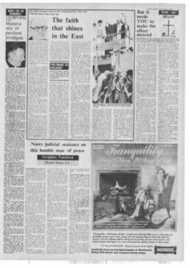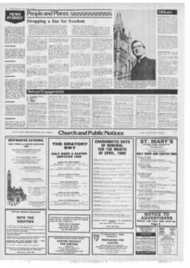Page 10, 28th March 1980
Page 10

Report an error
Noticed an error on this page?If you've noticed an error in this article please click here to report it.
Tags
Share
Related articles
Drive For Unity Threatened By Russian Split
Churches Agree New Ecumenical Commission
Vatican Mission In Moscow Discusses Visit By The Pope
Lebanon Talks To Thaw Rome-orthodox Frost
Esuit General In Four-day Visit To Russia
I10 nside the HERA L D , F i V i 980 Russian Church by a
Jesuit at work in Leningrad
WII1LE the Vatican looks forward to unity talks with the Orthodox in seven weeks time on the island on Patmos, the Orthodox church in Russia has unity problems of its own. It is accused by some Soviet Christians of being merely a government stooge. Fr Miguel Arranz SJ the only Roman Catholic priest lecturing at Leningrad Orthodox Theological Academy explains the position of the Russian Orthodox to Desmond O'Grady.
CHRISTIANITY is showing surprising vitality in the Soviet Union.
This emerges from a recent trip there, from conversations with priests working in Russia, and reading about the situation.
A traveller is struck by the crude anti-religious propaganda displays in those churches which have been turned into museums of religion. But other churches are open to the faithful and wellattended.
The new Soviet Constitution of 1977 not only recognises, as was the case before, but guarantees citizens the right to "profess any religion or none at all. to perform religious rites or to conduct atheistic propaganda". (The state subsidises atheist propaganda but religious proselytism is banned.) Westerners sornetimes consider the Russian Orthodox Church, by far the largest Christian group in the Soviet Union, as a mere stooge organisation useful to back-up the regime's foreign policy. Some Orthodox laity have criticised their church leaders for not speaking out for human rights.
Father Miguel Arranz, a Spanish Jesuit who teachers at the Leningrad (Orthodox) Theological Academy. denies this negative assessment. Arranz's experience as the only Catholic priest teaching in an Orthodox academy in Russia has convinced him of the Orthodox Church's authenticity and vitality. Arranz's background gives him a particular insight into the Russian Orthodox Church's S ituation.
He was born in Guadalajara, Spain, in 1930, son of a Socialist post office worker who fought for the Republicans against Franco, and. us a consequence, was imprisoned and lost his job.
Miguel's Mother was Catholic
hut did not let her atheist husband know she attended Mass.
After General Franco's victory, Miguel, who had grown up mainly among atheists. almost under duress made his first Communion. But he found he was fascinated by religion and at 11 decided he would be a priest.
"Don't tell your lather he's so anti-religious he'll kill you," his mother advised.
But this was not his father's reaction: "I fought for liberty and lost", he said, "but my son must be free to make his choice".
Miguel studied for the priesthood at Toledo seminary. As he was interested in the Russian mission. he transferred to the Jesuit's Russican College in Rome and studied theology at their Gregorian university. 1n 1954 he was ordained arid entered the Jesuit Order.
After some years teaching in France, in the mid-1960s Arranz became a lecturer at the Jesuit Oriental Institute in Rome. In 1967, he was an interpreter for the meeting between the Russian Orthodox Metropolitan Nikodini and Pope Paul VI.
Out of Arranz's meeting with Nikodim came, eventually, the opportunity to graduate as Master of Theology (with a thesis on the mediaeval liturgy of Santa Sophia in (onstantinople) in Leningrad's Ecclesiastical Academy and to teach there as well as in the Oriental Institute.
"In Rome, I'm an Orthodox Communist," Arranz says laughing, "while in Leningrad I'm a Catholic capitalist."
Arranz says that in the Eastern tradition the Church was never conceived as a society parallel to the state with authority to challenge it.
But what of their defence, for instance, of Chile's Pinochet combined with their defence of Soviet policy in bodies such as the World Council of Churches?
"You could classify a reproof of Pinoehet as fraternal correction as he claims to be a Christian." Arranz replied, "but the Russian leaders make no such claim.
"You can't assume that Russian Orthodox churchmen have full information on issues they comment on. You would expect them to oppose the neutron bomb under any circumstances. But it should be kept in mind that their situation is difficult ... Nor should we be too surprised if they make patriotic statements. Cardinal Spellman made patriotic statements during the Vietnam war. And the Spanish bishops kept quiet about Franco's injustices."
Estimates of the number of Russian Orthodox vary from 30 million to over 100 million. In a recent interview with the Parisian daily, Le Figaro, Bishop Chrysostom, who handles the Moscow Patriarchate's foreign relations, said that the Church has 62 dioceses and 75 bishops.
In Moscow there are 43 churches open and 132 in the Moscow district. Altogether there are three seminaries: in Moscow (Zagorsk). Leningrad and Odessa with a total of 900 students plus a theological correspondence course for another 8(K) priests or aspirant priests.
(A bishop can appoint as priest any man he thinks suitable but he then has to study theology and can do so through a correspondence course while working in a parish). The Russian Orthodox church is said to have less than 10,000 priests.
The number of vocations has risen steadily in recent years. an indication of the increasing attraction the faith exerts among young people. Many of the priestly vocations occur among adult converts. particularly those with university training.
It takes courage to follow a priestly vocation in the Soviet Union but priests receive strong support from their congregations. Priests cannot take the initiative in opening new parishes. The initiative lies with the faithful because Soviet law does not recognise churches but associations of citizens who may "perform religious rites together".
It requires 20 or more faithful to request permission from the local Soviet (council) to open a church for such rites. The response of the soviet varies according to its members' otalook. Permission can be easily revoked.
Although appointed by their bishop, priests are employees of the citizens' association which has requested a church. They are fully employed in administering sacraments. The Byzantine litury used is that evolved in the tith century by St John Damascene for Christian communities in the Middle East under Muslim rule. It is catechesis as well as prayer.
There are three occasions during Mass for comment by the priest the only ones available to him. One is the homily after the gospel; the second is during the priest's Communion: and the third, the Godspeed comment at the end. The comment has to concern the faith but not any social implications.
_Mass usually lasts at least two hours. The longer the better for the babooshkas, the old women who are a big proportion of the congregations. They are important as unofficial catechists: young people are at school on Sunday morning and, in any case. often are cautious about being seen at Mass.
Russian Orthodox laity, according to Arranz, are very generous. "I've worked in Puerto
Rican parishes in New York," he said, "but the collections are bigger in Russia".
The faithful's generosity is highly important. The money not used for the upkeep of clergy goes to the state bank. Substantial contributions are also made to the state fund for peace presided over by scientists and artists. Such contributions do not displease local soviets.
As control of church affairs is exercised at the local level, the situation varies front place to place but it is never easy as the churches are confessing faith in God in a godless state.
Nevertheless, or perhaps because of this, Father Arran/ says: "The Russian Orthodox church has great spiritual energy". And he says he does not think stooges have infiltrated it.
The Russian Orthodox Church in the Soviet Union is concerned about its relations with the Russian Orthodox Church of the diaspora whose members accuse it of a sell-out to the Soviet State. The accusation. said Bishop Chrysostom. "ignores our situation. Our faithful are members of an officially atheist society. But where are the frontiers of disbelief'? ... They pass through the heart of our families. Who should we declare war on? ls it necessary to set father against son, brother against sister'?"
Whereas the pre-Soviet Russian Orthodox Church was intensely nationalistic. the Russian Orthodox Church now is more ecumenically-minded. Paul VI was popular with Russian Orthodox churchmen. "Even though a Pole has been elected as his successor," said Chrysostom, "if he follows Paul VI's policies Our relations will improve."
The Soviet system does allow a limited freedom for Christian churches which, contrary to Communist expectations, have not withered away as mere superstition. On the contrary, 63 years after the Bolshevik Revolution. they are showing a vitality which, in Marxist terms, is Li naccountable.
blog comments powered by Disqus











